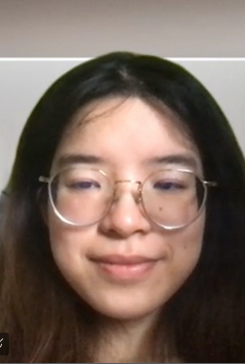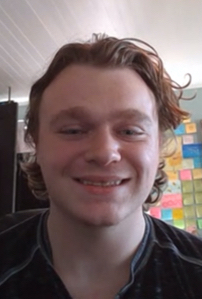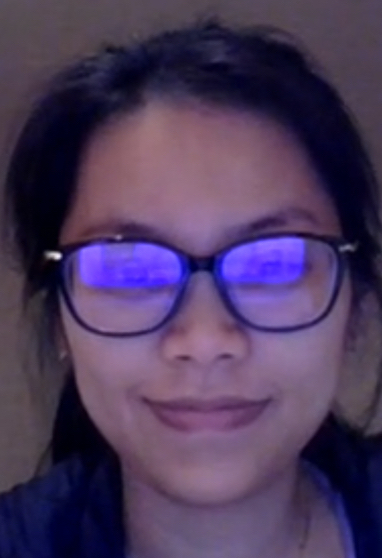An Nguyen, Enqian Zheng and Same Bevins meet by videoconference during the CCI program.
With the addition of a community college internship program, Jefferson Lab is now offering STEM career opportunities to an even more diverse range of students
NEWPORT NEWS – Offering as many students as possible the opportunity to explore careers in science, technology, engineering and math can help broaden diversity in these critically important fields. The U.S. Department of Energy’s Thomas Jefferson National Accelerator Facility offers STEM programs for students from elementary school through graduate school, and now, it has expanded its internships to include an option for students who are enrolled in community college.
Jefferson Lab recently began participating in the DOE’s Community College Internships (CCI) program, which seeks to encourage community college students to enter technical careers relevant to the DOE mission by providing technical training experiences at the DOE National Labs.
“We’re always trying to find ways to strengthen the STEM channel, and taking part in the CCI program seemed like a logical step to help fortify the pipeline with diverse talent,” says Lisa Surles-Law, Jefferson Lab Science Education team lead. “About a year and a half ago, we decided that we wanted to participate. In the three semesters that we’ve participated in the program since then, we’ve had students take advantage of these openings.”
Most recently, DOE announced that 90 community college students from across the U.S. will work directly with DOE National Lab scientists and engineers this summer on research and technology projects through the CCI program. One of those students, Noelle Phillips, from Salt Lake Community College, will attend a virtual internship at Jefferson Lab in cybersecurity.
Phillips will join 56 other virtual summer interns from several other programs at Jefferson Lab, including DOE’s Undergraduate Physics Researchship, large cohorts from DOE’s Science Undergraduate Laboratory Internships and the National Science Foundation’s Research Experience for Undergraduates, and the lab’s own High School Summer Honors Program. Both the CCI and SULI programs are managed by the Office of Workforce Development for Teachers and Scientists in DOE’s Office of Science.
“We wanted to offer as many opportunities as we could. It’s a challenging time to take on an internship that’s remote, and yet, this is the largest group of interns that I can remember hosting at the lab, so we are honored and proud that they want to do this,” Surles-Law says.
In addition to conducting a research project with a national lab mentor, each summer intern will present a project poster and document it in a research paper or other format appropriate for the subject matter. The CCI program entails 400 hours of work over a period of 10 weeks in the summer or up to 16 weeks during a school semester.
Since joining the CCI program in the fall of 2020, the lab has supported three other students: An Nguyen, Renton Technical College; Enqian Zheng, Pasadena City College; and Sam Bevins, Thomas Nelson Community College. Nguyen and Zheng both participated in the program in the fall 2020 and spring 2021 semesters in engineering projects, and Bevins participated in the spring 2021 semester in a theoretical nuclear physics project.
Surles-Law says that although the Jefferson Lab CCI program is in its infancy, she hopes that Phillips is just the latest in a long line of future interns from community colleges.
Contact: Kandice Carter, Jefferson Lab Communications Office, kcarter@jlab.org




